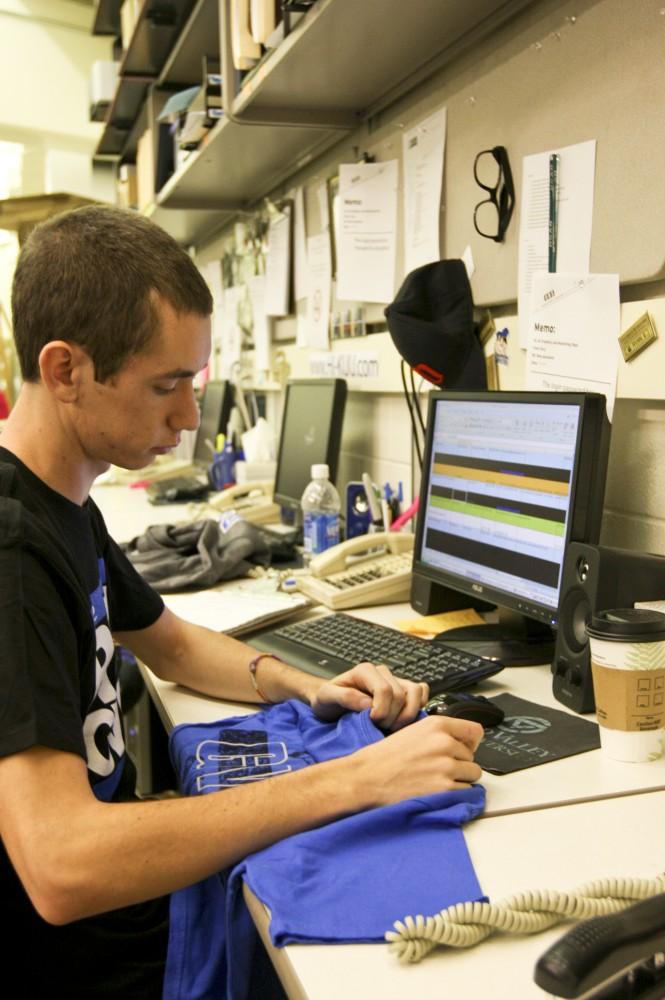UBS ensures no official GV apparel made in sweatshops

GVL / Eric Coulter Ryan Comeau inspects a shirt from the University Bookstore, making sure that none of the clothing is made in sweat shops
Sep 27, 2010
Workers crowd into a small room where the door is locked behind them. They each hunch over their own sewing machine where they will stay for the next 12 hours, working to earn less than minimum wage. This is their reality seven days a week, all to produce hundreds of hoodies embroidered with the logos of American universities so students miles away can show off their school pride.
Thanks to one student hired on behalf of the Workers Rights Consortium by the University Bookstore, Grand Valley State University students can rest assured their university apparel will never be produced in such a manner.
Ryan Comeau, a fifth-year senior, has been the WRC liaison for GVSU and was hired by UBS two years ago. The position has been in place at UBS for more than five years.
The WRC is an independent organization monitoring workers’ rights in factories around the world, especially in the garment industry. WRC partners with numerous universities to make sure the apparel they sell is not produced in sweat shops. Thanks to one student hired on behalf of the Workers Rights Consortium by the University Book Store, Grand Valley State University students can rest assured their university apparel will never be produced in such a manner.
Kyle Douglass, assistant store manager of UBS, explained that Comeau helps cross check products with their vendors to get contact information and location for specific factories where the apparel is produced. Comeau then reports the information to WRC who can follow up with the international factories and conduct further investigations into working conditions as necessary.
“It’s a pretty thorough practice,” Douglass said. “It guarantees we never sell something that comes from a sweat shop.”
In the first year that UBS hired an employee to focus solely on working with the WRC, Douglass said they uncovered a lot of questionable working conditions where their apparel was produced. Since dealing with those issues, UBS has mostly been double checking the factories of their suppliers as new orders come in.
UBS begins to sell their apparel as soon as they receive the order. Comeau then checks the background on each product and submits the information to the WRC. If there are any problems obtaining factory information or any questionable work conditions revealed, UBS pulls the products from its shelves.
“We hone in on who’s the good guys and who’s the bad guys and we don’t want to work with bad companies,” Douglass said. He added that as a facility of the university, it is important to UBS to be in line with the mission and values of GVSU.
In the past, one popular retailer refused to provide UBS with further information about contacting its factory. UBS tried to convince them to comply, but ultimately the store cancelled its contract with the company, though there was no concrete evidence of poor working conditions where the clothing was made.
“(The clothing) may cost more from a good factory, but it’s usually better made and worth the ethical standard,” Douglass said. “The biggest and most important reason (to monitor labor conditions) is to be proactive, stay ahead of the curve and produce a product that is within ethics of use.”
For Comeau, his commitment to ethically-produced apparel goes beyond his job requirements.
“My personal belief, and UBS’s, that I try to uphold is that all humans should have a basic set of rights,” Comeau said. As a philosophy major, he said ethics and socio-economic inequalities have always been of interest to him, especially in the garment industry known for oppressive work conditions.
Some of the basic rights Comeau said all workers deserve are safe working conditions, proper ventilation, fair wages with compensation for overtime, vacation time and reasonable work hours.
“We take pride and care in the clothing we sell,” Comeau said of UBS. “We want it to be as ethically-responsible as possible.”
Comeau said the college market does have an impact on the garment industry, and he urged students to be more aware of where their clothing comes from.
“Losing one university might not be a huge deal,” Comeau said of UBS’s influence on apparel companies. “But other schools can follow, and losing college students is a big market group. By upholding our standards and not making exceptions, we can make an impact.”
Brian’s Books, another apparel and book store serving GVSU students, also makes an effort to ensure their clothing is produced ethically. Though Brian’s Books does not have a specific staff member to monitor its apparel, the store is a member of another sweatshop watch group that keeps retailers up to date on what suppliers are doing and which ones to avoid.
“We try to adhere to that (list),” said Brian Page, owner of Brian’s Books. “Everyone we work with is pretty legitimate in that respect. On a personal level, I don’t want to support any type of worker abuse.”
More information on the WRC is available on their websites, www.workersrights.org.

























